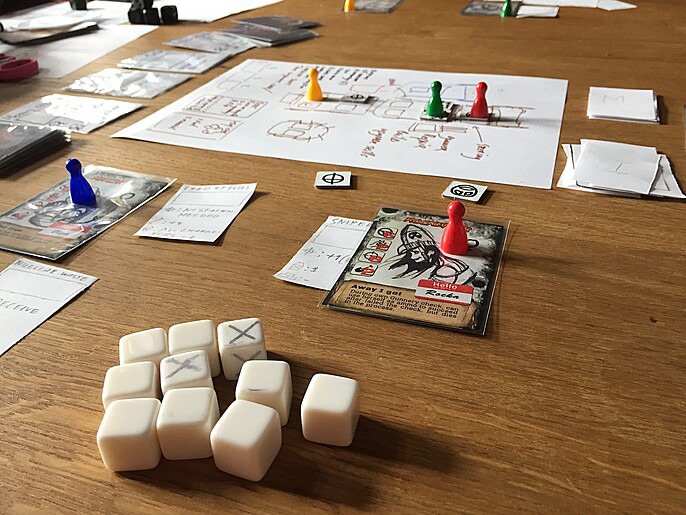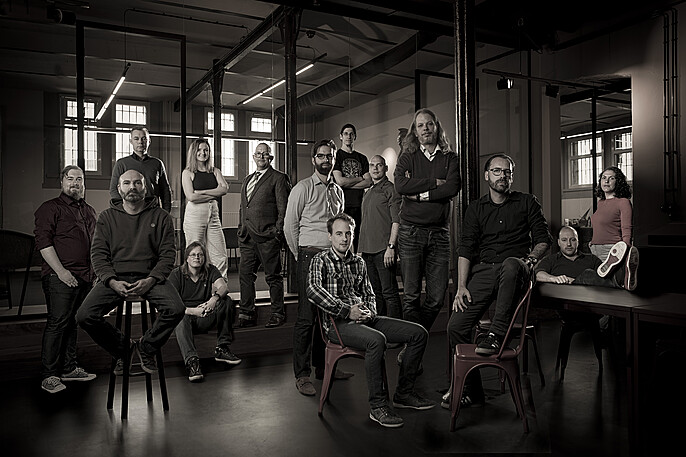
An Interview With a Game Designer at Grendel Games
Friso Roolvink is 36 years old and currently working as a game designer at Grendel Games after being a producer there for roughly 6 years. He worked on a ton of projects, mostly for clients. Many are serious games that have a purpose other than pure entertainment, for example, learning, training, creating awareness, or habit creation.


He was responsible for making sure that games were delivered on time and within budget.
Before he started working at Grendel Games, he had his own indie game studio where he managed a small team. Some of his career highlights are the development and release of the indie game ‘Reign of Bullets’, the development of an MMA training app sitting at 3 million downloads, setting up a Motion Capture studio and winning several awards with more serious games at Grendel Games.

He loves board games, playing and creating them. As a long-time Global Game Jam site organizer, Friso figured the concept would work for board games as well and last has already organized the 8th yearly Board Game Jam.




His current hobby project is converting the auto chess genre (games like Teamfight Tactics, DotA Underlords, etc.) to an easy-to-play physical card game.
Here, we learn more about his work.
When did you originally start at Grendel Games?
I started working at Grendel Games at the end of 2016. However, I had already done an internship and graduation project there in 2010. So I’m already familiar with them for a long time.


What made you want to work there? How was working at the studio?
I had been working together with friends in our indie studio when I saw the opportunity to work as a producer for Grendel Games. I loved working with my friends in our game studio, but I noticed that I was doing a million different things within the company. I noticed that I wasn’t happy being so divided with tasks and disciplines, never having the opportunity to really specialize and get good at one thing. Working at Grendel Games as a producer was an opportunity to focus and really grow in one discipline: managing projects.
It was a big difference, coming from a small studio with friends and suddenly working on really big projects with big budgets and people much more talented than me. In the short time after that, I have grown immensely, it was great to have the opportunity to learn from veterans.
Tell us about your journey to becoming a producer.
It was rough and stressful :’) I thought I had quite some experience after managing projects for 7-8 years, but boy was I wrong. I was used to making plans, and budgets, helping a development team in their daily work, and all the things you do as a producer. But the level of detail, the quality requirements, the people, and the tight working schedules at Grendel Games are on a whole other level.

Luckily I had some great guidance from both management and the team and even though it was sometimes difficult to live up to expectations, I always felt appreciated and valued.
Everything I have learned, I owe to the people around me. It shows how important the people I work with are in my professional development.
What are your day-to-day responsibilities?
Most important was to spot blockers and difficulties leading to a delay in production and solve them. We do daily check-ins to see if anyone is running into any trouble and to see if we are on track with our (sprint) goals. I was also spending a lot of time in spreadsheets, monitoring budgets, time reports, and team planning.
But actually, the responsibilities are very diverse. From simple tasks like setting up cleaning schedules, organizing meetings, and ordering office material to writing financial reports and forecasts and setting up a product portfolio management system. And the list of things you do as a producer goes on, it’s impossible to describe it all because every day you run into new problems that require their own specific solutions and activities.
What do you wish you would have known?
Being a producer means that you have to be comfortable with people not liking you. It is in my nature to keep everybody happy and I really want everybody to like me. But in a position where you are balancing so many interests, it is impossible to give everyone what they want.
To be a good producer means to be honest about what is expected from people and what people will get.
This goes for the team, the client and management. In the end people will appreciate that much more then somebody who is failing at keeping everybody happy.
What skill would have helped you before you worked in the role?
It’s a cliché but communication is key. The skill to communicate problems clearly and directly while still keeping people on board. For example to point out a problem, but also to offer help or a solution. This requires alertness to spot the problem, knowledge of the subject to come up with a solution, and experience to know if that solution will work.
What is your favorite part of the job? Least favorite?
My favorite puzzle of the day was always team planning. Who will work on what? How do we order the sprints? How do we plan everything so that we meet our deadlines while keeping everybody happy and in a position and project where they feel comfortable and confident?
And in a completely different area, I just love working with the people at Grendel Games and being amazed by all the things that these talented people create.
The least favorite part was collecting time registrations and writing reports about it for bureaucratic processes to prove that we actually did our job. Everything is old-school printed and signed individually, stacks and stacks of paper. I never thought I would see these classic stacks of papers and forms, as you see in the movies, on someone’s desk at a game company.
What's the transition to game designer been like?
It was very difficult at first. I made the decision after a talk with my boss where we discussed that I might not be in the right spot as a producer. To me, that felt a lot like failing at my job.
In retrospect, it was a great decision to transition to game design. I think I did a good job as a producer, but as a game designer I love everything I do. Game design has always been my passion and I love every aspect of it right now, even the stuff that is generally considered boring. I’m much happier with my day-to-day activities and confident that I can add a lot of value to the company as a game designer as well.
Why did you make the shift?
From the start of my professional career (and even as a student and before that), I always automatically rolled into the position of manager. It matched my skill set and I was okay with doing it. After building up a lot of experience in managing positions, I naturally applied to a role as a producer because it was just what I had been doing most of the time during my career.
But for a company like Grendel Games, I was still relatively young (30) and inexperienced (had only worked in a small studio and small teams) to be in a position with so many responsibilities and expectations. It had always been a struggle to perform on the level that Grendel Games needed and even though I had a lot of successes, there was also plenty to improve.
That, combined with the fact that I really love game design, made me shift from my role as a producer to my current role as a game designer.
What do you like most about your current role?
The diversity and the required creative thinking for coming up with solutions. Not a single day is the same and you get challenged differently every day. In addition, you learn about a lot of different subjects since every serious game is usually about a specific subject or problem.

By making serious games I have trained in surgical procedures, learned about climate adaptation, practiced sales techniques for beverages, and learned about a dozen other subjects. Some subjects more practical than others, in any case you should not ask me to perform surgery on you.
What is some advice you'd give to someone who wants to work at a studio?
Be bold and be honest. When you apply at a studio, be honest about what you can give and what you need. Remember it’s not just about getting that job, it’s about finding a good match between you and a game studio. A little bit like dating.
Don’t settle just for whoever wants you, don’t try to be someone you are not, be clear about what you are looking for, and keep your mind open to all kinds of opportunities.
But do come well prepared and write a neat application letter. The first impression is still very important.